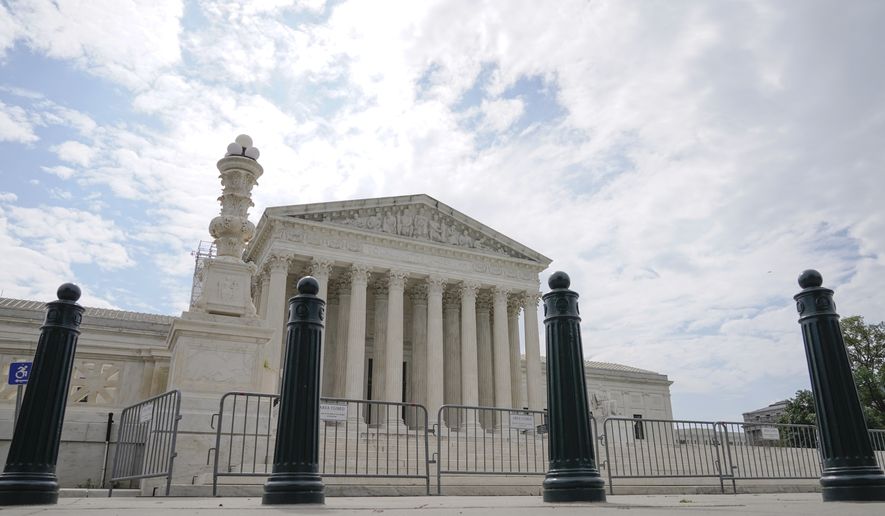The Supreme Court rejected the independent state legislature theory in a ruling Tuesday, deciding that courts do have a role to play in refereeing how elections are conducted.
In a 6-3 decision, the justices shot down Republican lawmakers’ theory that the U.S. Constitution invested final say over election rules with “the legislature” of each state and that state courts must butt out.
Chief Justice John G. Roberts Jr., writing for the majority, said courts have claimed the power to check other branches of government, including election operations, since the country’s founding. Because elections are conducted under the federal and state constitutions, state courts have a say, he said.
“Since early in our Nation’s history, courts have recognized their duty to evaluate the constitutionality of legislative acts,” the chief justice wrote. “Our precedents have long rejected the view that legislative action under the Elections Clause is purely federal in character, governed only by restraints found in the Federal Constitution.”
Civil rights groups and liberal election advocacy organizations hailed the decision. They warned that freeing state legislatures from state court review could lead to election chaos.
Without state courts’ oversight, the groups said, conservative-controlled legislatures could enforce laws limiting access to the polls, approve gerrymandered legislative districts and even overturn election results.
Those supporting the opposite theory pointed to the U.S. Constitution’s elections clause, which says: “The Times, Places and Manner of holding Elections for Senators and Representatives, shall be prescribed in each State by the Legislature thereof.”
The dispute was over whether the use of “legislature” placed state assemblies’ election decisions beyond the realm of state courts’ review or whether that review was always assumed to be part of the normal legislative process.
The issue became particularly acute during the pandemic restrictions. Some state judges rushed to impose rules on the 2020 elections by expanding the use of mail-in ballots, ordering changes to access at polling stations and declaring other rules.
Justice Clarence Thomas, leading the dissent, said the Supreme Court ruling will create legal challenges.
“I fear that this framework will have the effect of investing potentially large swaths of state constitutional law with the character of a federal question not amenable to meaningful or principled adjudication by federal courts,” Justice Thomas wrote. Justices Samuel A. Alito Jr. and Neil M. Gorsuch joined his dissent.
Justice Thomas said the case should never have been decided in the first place.
It stemmed from a dispute in North Carolina, where the Republican-led General Assembly redrew legislative district lines after the 2020 census. Numerous plaintiffs challenged the maps as illegal political gerrymandering.
Although political gerrymandering is not illegal at the federal level, the North Carolina Supreme Court initially ruled that it was illegal under the state’s constitution.
After a change of power at the state’s high court, the state justices revisited the case and altered their ruling. They found that the questions about gerrymandering were not subject to state court reviews.
Justice Thomas said that should have been the end of the matter for the U.S. Supreme Court because the controversy had been resolved.
Chief Justice Roberts spent a good portion of his 30-page opinion justifying the court’s continued intervention. He said questions about the North Carolina Constitution and gerrymandering may be moot but the state Supreme Court’s original decision striking down the original legislative maps remains.
“As a result, the legislative defendants’ path to complete relief runs through this Court,” he wrote.
He delved deeply into state courts’ role during the time of the Constitution’s adoption and found that they claimed powers of judicial review. He said it was widely understood that legislatures were created by constitutions and were therefore bound by the usual rules of those documents, including courts’ rights to decide whether lawmakers were within bounds.
That includes election law, he ruled.
He issued a note of caution saying state courts must give special solicitude to lawmakers on election issues because the Constitution specifically imbues the “legislature” with power. He said federal courts can ensure state courts show proper restraint.
“In interpreting state law in this area, state courts may not so exceed the bounds of ordinary judicial review as to unconstitutionally intrude upon the role specifically reserved to state legislatures by Article I, Section 4, of the Federal Constitution,” he wrote.
Justice Thomas said he expects federal judges to be drawn into all sorts of questions.
The questions will arise haphazardly in the midst of quickly evolving, politically charged controversies, and winners of federal elections may be decided by a federal court’s expedited judgment that a state court exceeded ‘the bounds of ordinary judicial review’ in construing the state constitution,” he wrote.
Liberal advocates breathed a sigh of relief.
“The independent state legislature theory is now dead,” said Wendy Weiser, vice president of the Democracy program at New York University’s Brennan Center for Justice. “The court said that state courts can now freely enforce constitutional rights and guarantees as they have for hundreds of years. Our system of checks and balances still stands.”
Principal deputy White House press secretary Olivia Dalton said the theory, if successful, would have “opened the door for politicians to undermine the will of the people and would have threatened the freedom of all Americans to have their voices heard at the ballot box.”
She said the administration will continue to push for congressional action to “ensure there are fair congressional maps and that people have access to the ballot box.”
J. Christian Adams, president of the Public Interest Legal Foundation, which filed a brief backing state legislatures, said the ruling “reduces the power of the people to set their own election rules.”
“The state legislatures are closest to the people, and they should determine how congressional lines are drawn not state court judges,” he said.
• Tom Howell Jr. contributed to this report.
• Stephen Dinan can be reached at sdinan@washingtontimes.com.
• Alex Swoyer can be reached at aswoyer@washingtontimes.com.




Please read our comment policy before commenting.